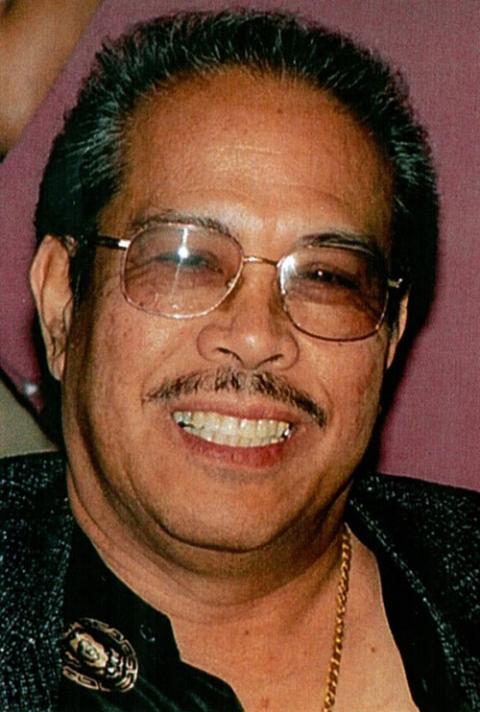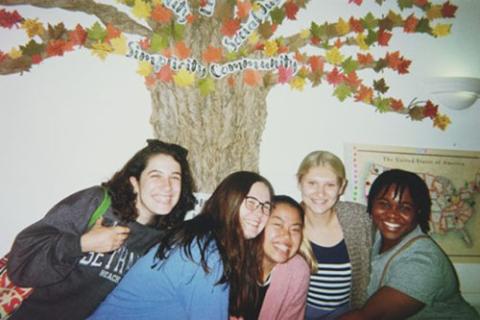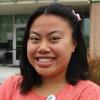
My family in 2006. From left: Osmundo Evangelista Jr. (my papa), holding Jenalyn Evangelista (my baby sister); Joseph Evangelista (my older brother); and Maria Ignacio (my mom), holding me. (Courtesy of Jaesen Evangelista)
Editor's note: Notes from the Field includes reports from young people volunteering in ministries of Catholic sisters. A partnership with Catholic Volunteer Network, the project began in the summer of 2015. This latest round of the series features volunteers in Orange, California; Nazareth, Kentucky; and New York City. Read more about Jaesen here.
My papa battled prostate cancer for roughly a decade, and he was in complete remission when I was 15. He was fine. He was going to live for a long time and see me graduate from college, get my medical degree, get married, have children.
But one day in the summer of 2020, he noticed his lips were numb and so he went to the ER. It was supposed to be a small checkup because he was going to be fine.
That was the last time I saw him at home.
Turns out the cancer came back and moved into his spine. Within a couple of weeks, it spread throughout his bones. COVID-19, financial burdens, physical pain and medical stress were all incentives for my dad to deny further treatment. Besides, he knew this time was different. So he transferred himself to the hospice, where he died on July 20, 2020.

My papa, Dr. Osmundo Evangelista Jr. (Jaesen Evangelista)
My father was a lot of things. He was a good cook with Filipino food, but not so much when it came to other foods. He loved playing games, especially mahjong. In fact, when he taught our family how to play, he kept us at it from 11 p.m. to 8 a.m. the next day. He was extremely emotional. I remember seeing him cry every time I came home from college for my breaks and again when I returned.
So, you can imagine the immense emptiness I felt after he died. Have you ever lost someone, and no matter how much you search in all the things you're used to, you never feel whole again?
I cooked Filipino foods just the way he did, but it never tasted the same. I played mahjong with my family, and though it was fun, we never had the energy to go for nine hours again. I remember turning around as I entered the TSA line at the airport and only seeing my mom.
It just wasn't the same. None of it was, and for many months it never really got better. I slept for days, I never went outside, I was numb in my virtual classes and, with social distancing mandates in place, it felt like I had no one to turn to. It was an intense time of loneliness, depression and grief.
But by holding papa so close to my heart, I learned something new: Death ends life, but it does not end living.
My papa was an amazing Filipino cook, an overeager mahjong player and an emotional father. All that is part of me, but he gave me something more: his legacy.
My father cherished his close friends and family. He always visited his co-workers, siblings, nieces and nephews. He gave everything he had to them and he made sure that they were well taken care of.
Advertisement
With his death, dozens of old friends contacted me virtually: high school friends, elementary school classmates, family members that I hadn't heard from in seven years, old teachers, co-workers, people I met during volleyball tryouts in middle school, when I never made the team.
They cherished me — and I cherished them. I celebrated holidays with long-lost family. I met the kids of my old classmates. I learned that my teacher also lost their father to prostate cancer.
My father was also a strong man of faith and service. He built a church in his home province of Pangasinan, Philippines, by raising funds for bedrooms, clothing, food and classrooms. Dozens of children use the church as their home and school. To this day, it is a safe haven for the poor.
With his life's work, he inspired me to find my purpose and follow my spirituality. So, I joined the St. Joseph Worker Program of Orange.

Sr. Mariquita Domingo tells me about her ministry and calling to religious life at the Regina Residence Christmas party. (Courtesy of the Sisters of St. Joseph of Orange)
I learned new lessons about my faith from the Sisters of St. Joseph of Orange, such as the meaning of the Camino de Santiago and knowing God was always with me.
I opened my heart to living in a new community. There are five other women in my service program: Emily Michaelis serves the elderly Sisters of St. Joseph of Orange within Regina Residence; Emma Shay teaches writing to elementary school students of St. Joseph School; Nina Dorsett is a campus minister for high school girls at Rosary Academy; Honorine Uwimana is working toward her master's in public health and previously served at Regina Residence; Cindy Emenalo works with me at Mission Hospital, specifically for the Community Health Enrichment Collaborative Family Resource Center.

This year's St. Joseph Workers after our first trip to Newport Beach. From left: Nina Dorsett, Emma Shay, Jaesen Evangelista, Emily Michaelis and Cindy Emenalo. (Courtesy of the Sisters of St. Joseph of Orange)
We've cried together, laughed together, prayed together, and supported each other through our own struggles.
I immersed myself in service. Among other things, I have met the homeless people of Orange County; I learned their names and their stories. I worked with caregivers to connect them with friends and family, to find them homes, jobs and medicine, and to make sure their lives continue in the care of others.
Now a year and a half after my papa passed away, I wouldn't say I'm healed. To be honest, I still haven't cooked Filipino foods perfectly nor have I been able to play mahjong as well as he taught me.
However, in his death, papa breathed new life into me. He gave me a legacy to live, a faith to pursue, and a community of family and friends to be part of.
I never really lost my papa. His spirit is within me, and I will live in his presence wherever I go.






